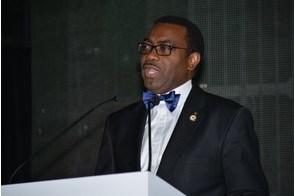IFC, DFID partner to boost solar investment in Nigeria

Summary
Eme Essien Lore: "The solar market has the potential for quick wins in bringing access to electricity for more businesses as it takes less time to install."
The International Finance Corporation (IFC) and the UK’s Department for International Development (DFID) have launched a new partnership to facilitate the deployment of off-grid and embedded solar systems in Nigeria, according to a statement released on Tuesday.
The IFC/DFID partnership comes after the Nigerian Bulk Electricity Trading Company (NBET) signed power purchase agreements in July this year with 12 companies for the construction of 975MW solar plants in seven states -- Enugu, Nasarawa, Kaduna, Katsina, Bauchi, Plateau, Sokoto -- and the Federal Capital Territory, Abuja. The projects are worth about $2.5 billion.
Under the new partnership, the IFC’s Off-Grid and Embedded Solar Market Development and Finance Program and DFID’s Solar Nigeria Program will launch a new programme that will assist Nigeria harness its abundant solar resources to provide reliable electricity for the commercial and industrial sectors.
“IFC has been at the fore, creating and facilitating solutions to help increase access to energy at the home and corporate levels in Nigeria,” said, Eme Essien Lore, IFC’s Country Manager for Nigeria. “The solar market has the potential for quick wins in bringing access to electricity for more businesses as it takes less time to install. It also enables production of electricity at the point of need, which eliminates transmission losses to a great extent. We are working with DFID to accelerate access to electricity for more businesses and help contribute to economic growth in the country.”
The new IFC/DFID programme aims to provide technical support and financial instruments to local financial institutions in order to develop business solutions for the emerging solar market especially solar PV technology investments in Nigeria.
The programme is part of the World Bank’s Energy Business Plan for Nigeria in which each World Bank institution – the IFC, the International Bank of Reconstruction and Development (IBRD) and the Multilateral Investment Guarantee Agency (MIGA) – leverage their competencies and products to provide solutions for projects that encourage the viability and sustainability of the country’s power sector.
“The UK Government is committed to helping to increase investment in off-grid energy and accelerating the delivery of solar energy systems that will help improve access to energy for more businesses,” said Ben Mellor, Head of DFID Nigeria.
He added: “As access to energy is one of the most critical business needs in Africa and particularly Nigeria, the UK’s Department for International Development is determined to assist in bringing solar technology financing solutions to smaller businesses and corporates and we are working with IFC to help implement these solutions.”
Related
-
AfDB urges push towards zero emissions in Africa’s industrial sectors
The AfDB challenged African countries to take the lead in implementing strategies to effectively end carbon emissions in ...
-
Critical minerals shortages threaten energy transition – GlobalData
GlobalData’s latest Strategic Intelligence report, Critical Minerals (2024), identifies several main challenges to ...
-
AfDB provides $24mn to Rwanda for regional hydropower project
The project will increase Rwanda’s clean energy generation capacity by about 50 megawatts.








